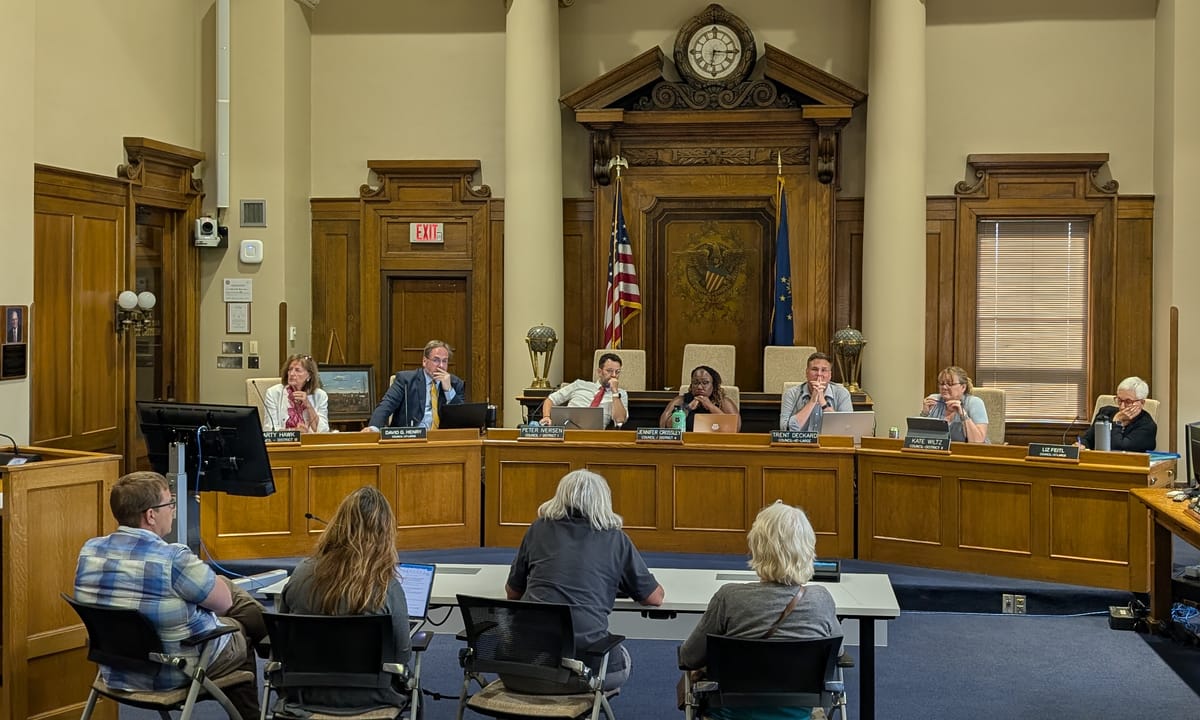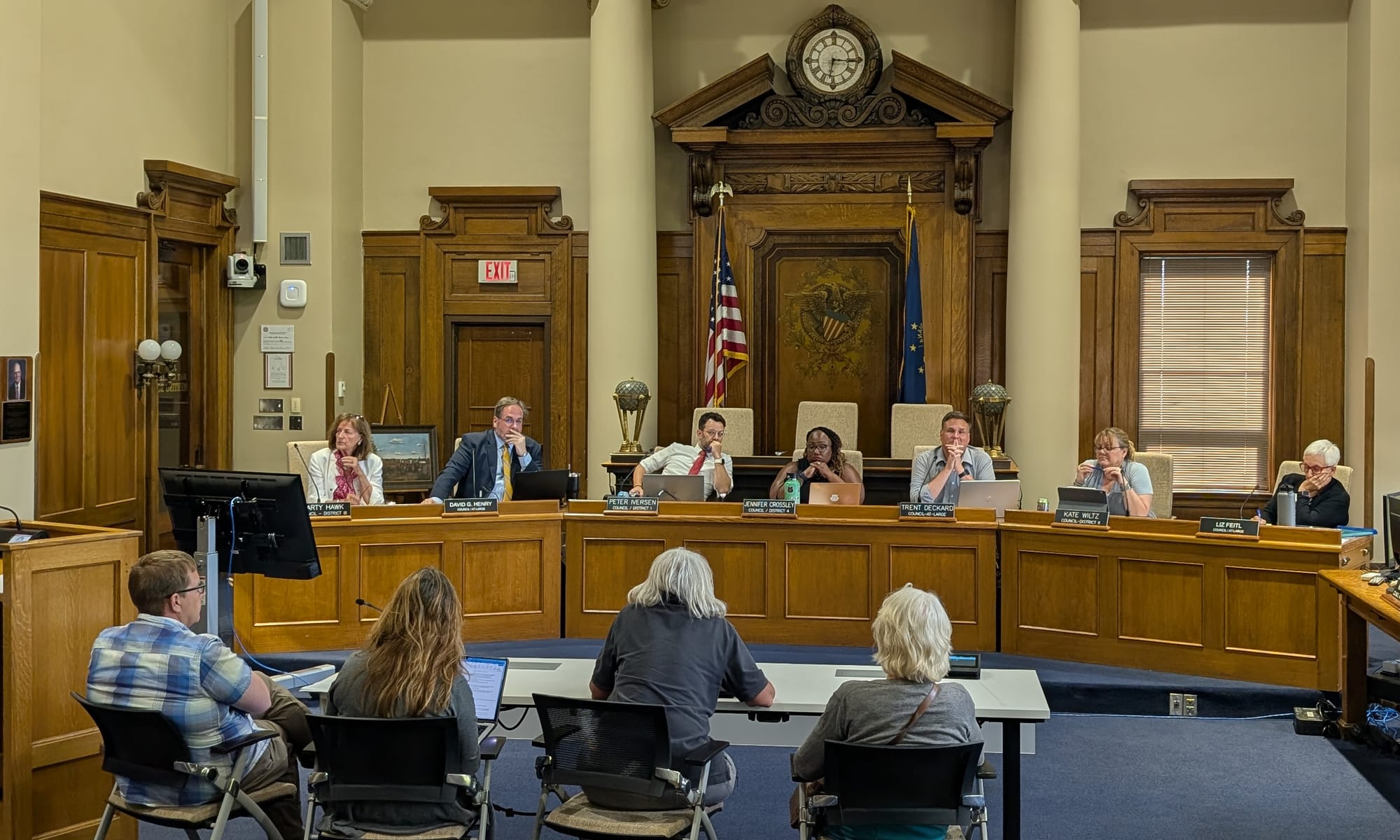Monroe County leaders split on letter to state lawmakers over funding for new jail
After an hour of discussion Tuesday night, Monroe County councilors and commissioners did not have a clear path forward for asking state legislators for changes to Indiana tax law that might help them finance the planned new jail. A draft letter was not put to a vote.


After an hour of discussion Tuesday night, Monroe County councilors and commissioners did not have a clear path forward for asking state legislators to enact changes to Indiana tax law that might help the county government finance its planned new jail.
A draft letter that the three commissioners had hoped would get support from the seven-member county council was not put to a vote at the council’s regular meeting on Tuesday. Based on the discussion, if a vote had been called, it would have likely failed.
All three county commissioners attended the county council’s Tuesday meeting.
At this Thursday’s (July 10) regular meeting of the commissioners, the topic could again get some airtime, but that’s not necessarily guaranteed, commissioner Julie Thomas told The B Square after Tuesday’s discussion.
One possibility is that the commissioners would forge ahead with the letter by the end of the week, which they also hope Monroe County's sheriff, Ruben Marté, and the 10-member board of judges will sign. Another possibility is that commissioners will wait to see if they can get support from the council, which is the county government’s fiscal body, before sending the letter.
As councilor David Henry observed, “In fact, it’s a fiscal question.” Henry went as far as to float the idea that such a letter on the topic of a request for revised tax legislation could come from the county council, with others signing the council’s letter. Henry put it like this: “So one would wonder if the letter should have the county council’s letterhead on it, with the signatories joining us …”
Concerns were deeper than just the letterhead. Councilors wanted to ensure that the timing and the content were right, with buy-in from Monroe County's legislative delegation, and its lobbyist, all working in concert. As councilor Peter Iversen summed it up, “It’s got to be the right person, at the right time, in the right place, with the right request.”
Prompting the deliberations by county electeds on a letter to the Indiana General Assembly is the impact of SEA 1, which was enacted in this spring’s legislative session. SEA 1 has consequences for the county’s current plan to finance a co-located justice facility and jail in North Park with around 500 jail beds. The most recent price tag that has been presented to county officials, by DLZ Corporation in February, calls for $207 million in construction costs and another $30 million in soft costs.
In October 2024, the county council enacted a local income tax (LIT) for the new jail at a rate of 0.17%. The county’s jail financing plan also includes using proceeds from the county government’s share of the 0.69% economic development LIT that was imposed countywide by Bloomington’s city council in May 2022. Even if the county government taps revenues from both kinds of local income tax revenues, it would have a bonding capacity that would still leave it a little short of the total $237 million price tag for the new jail.
Two features of SEA 1 add to Monroe County’s jail financing challenge. One is a limit on the amount of total LIT revenues that can be pledged towards debt service, which is 25%. Monroe County’s current financing plan calls for about 50% of its LIT revenues for the new jail.
Another feature of SEA 1 is the requirement that a county council has to renew the tax annually, which will have an impact on the interest rate for the bonds, given that the continuation of the tax would hang in the political balance every year.
One idea that has been floated as a part of Monroe County’s request of the legislature is to provide an exception to the requirements of SEA 1 for situations where a county is under an agreed court order to address jail overcrowding. Monroe County is a private settlement agreement with the ACLU on conditions at the jail dating back to 2009, which has been extended several times.
The letter gives two legislative options: allow Monroe County to exceed the 25% limit and to allow the existing LIT to be renewed automatically; or to allow Monroe County to enact a new, special LIT.
The tension between the county council and the commissioners on the topic of the letter was evident from the start of the council’s meeting on Tuesday. County council president Jennifer Crossley told the commissioners that she did not want to consider the letter during the departmental updates section of the meeting agenda at the start of the meeting, which had been the intent of commissioners. Instead, Crossley asked her colleagues to amend the agenda, to add the letter as an item of discussion at the end, which they did.
The letter did not get a warm reception among county councilors. Liz Feitl raised the question of public access to the letter. Feitl said, “This is a public meeting, and I feel strongly that [members of the public] don’t have access to it anywhere that I can tell …” She called for it to be read aloud. Feitl was also critical of the fact that the letter offered just two options for legislators. “I like options. I like a lot of options,” Feitl said.
Marty Hawk indicated that she did not like the idea of suggesting a new tax as an option. Hawk also said that the idea of a new tax had not been presented to the public.
Trent Deckard, recognizing that there was not much sentiment for supporting the letter in its current form, weighed in against taking a vote on the question. Deckard put it like this: “I do not believe the council should vote on this this evening.” He added, “Reading the room, I don’t think that would be a good vote for any potential goal of an outcome of a letter …”
David Henry wanted to know the impact would be of a potential council vote rejecting the letter in its current form. He put it like this: “So is it the intent that, if we take the vote and it fails, that the commissioners are intending to send the letter on Friday anyway? Or if we take the vote and it fails, we have an opportunity to draft this over the course of July together?”
Commissioner Lee Jones indicated that she didn’t think that night’s discussion would be productive: “I don’t know where we might go in the future, but it does not sound like we’re going to get anywhere tonight.”
Council president Jennifer Crossley countered by saying, “I think we can get somewhere tonight.” She continued, “I caution you to listen to what we are saying.” Crossley added, “I just want to see, is there a taste or an appetite for how to proceed with this council.”
Henry’s question about working jointly on the text of a letter through the month of July lingered for a good while, until Kate Wiltz pushed for an answer. She asked commissioners: “If we voted, and we voted it down, … could we work with you over the next month prior to you sending it out?”
Commissioner Julie Thomas said she would not speak for other commissioners, because they had not discussed that possibility.
Commissioner Jody Madeira left the door open to the idea that a joint letter was still possible. She said, “I think none of us have ruled that out.” Madeira added, “There’s a willingness at this bench, and I’m not hearing ‘no.’ And when there’s not a ‘no,’ there’s a ‘yes.’”
This Thursday’s meeting of the county commissioners starts at 10 a.m.




Comments ()